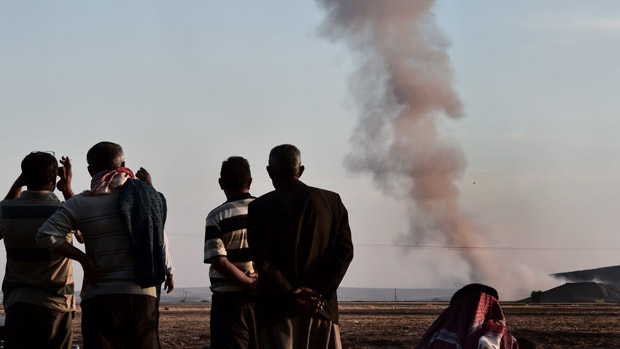Air strikes alone will not save Kobane, say UK and US
Kobane experiences most intense street battles so far, but US says its job is not to save Syrian towns

A free daily email with the biggest news stories of the day – and the best features from TheWeek.com
You are now subscribed
Your newsletter sign-up was successful
Air strikes alone will not stop the Syrian-Turkish border town of Kobane falling to Islamic State, the US and UK have warned.
American aircraft were attacking IS positions around the besieged town for the third day in a row yesterday, but a Pentagon official has warned that there are limits to what the campaign can achieve.
BBC correspondent Paul Adams described it as a day of "colossal explosions". From the border, Adams said the "relentless" sounds of battle could be heard as the town experienced its most intense street battles so far this week.
The Week
Escape your echo chamber. Get the facts behind the news, plus analysis from multiple perspectives.

Sign up for The Week's Free Newsletters
From our morning news briefing to a weekly Good News Newsletter, get the best of The Week delivered directly to your inbox.
From our morning news briefing to a weekly Good News Newsletter, get the best of The Week delivered directly to your inbox.
The Washington Post says the air strikes appear to be having some effect but the town still remains surrounded on three sides. The three weeks of fighting has left more than 400 people dead and forced 160,000 refugees across the border into Turkey.
"Airstrikes are not going to save the town of Kobane. We know that," said Pentagon press secretary Rear Admiral John F Kirby. "We all should be steeling ourselves for that eventuality."
Kirby told a press briefing that the strategic goal of US air strikes in Syria was to destroy IS infrastructure to protect Iraq, not to save individual Syrian towns.
Similarly, British Foreign Secretary Philip Hammond, who is visiting Washington, said it was "never envisaged" that the use of air power "in this battle would turn the tide in the short-term".
A free daily email with the biggest news stories of the day – and the best features from TheWeek.com
US officials have expressed growing frustration with Turkey's refusal to intervene. Ankara wants a buffer zone set up on the Turkish border inside Syria to ensure security and ease the refugee influx, but the White House has said it does not support the idea.
Clashes between Turkish police and Kurdish protesters continued in Istanbul last night, with many Kurds angry that Turkey has prevented fighters crossing the border to fight against IS in Kobane. At least 19 people have been killed so far in the protests.
-
 Gisèle Pelicot’s ‘extraordinarily courageous’ memoir is a ‘compelling’ read
Gisèle Pelicot’s ‘extraordinarily courageous’ memoir is a ‘compelling’ readIn the Spotlight A Hymn to Life is a ‘riveting’ account of Pelicot’s ordeal and a ‘rousing feminist manifesto’
-
 The EU’s war on fast fashion
The EU’s war on fast fashionIn the Spotlight Bloc launches investigation into Shein over sale of weapons and ‘childlike’ sex dolls, alongside efforts to tax e-commerce giants and combat textile waste
-
 How to Get to Heaven from Belfast: a ‘highly entertaining ride’
How to Get to Heaven from Belfast: a ‘highly entertaining ride’The Week Recommends Mystery-comedy from the creator of Derry Girls should be ‘your new binge-watch’
-
 Epstein files topple law CEO, roil UK government
Epstein files topple law CEO, roil UK governmentSpeed Read Peter Mandelson, Britain’s former ambassador to the US, is caught up in the scandal
-
 Iran and US prepare to meet after skirmishes
Iran and US prepare to meet after skirmishesSpeed Read The incident comes amid heightened tensions in the Middle East
-
 Israel retrieves final hostage’s body from Gaza
Israel retrieves final hostage’s body from GazaSpeed Read The 24-year-old police officer was killed during the initial Hamas attack
-
 China’s Xi targets top general in growing purge
China’s Xi targets top general in growing purgeSpeed Read Zhang Youxia is being investigated over ‘grave violations’ of the law
-
 Panama and Canada are negotiating over a crucial copper mine
Panama and Canada are negotiating over a crucial copper mineIn the Spotlight Panama is set to make a final decision on the mine this summer
-
 Why Greenland’s natural resources are nearly impossible to mine
Why Greenland’s natural resources are nearly impossible to mineThe Explainer The country’s natural landscape makes the task extremely difficult
-
 Iran cuts internet as protests escalate
Iran cuts internet as protests escalateSpeed Reada Government buildings across the country have been set on fire
-
 US nabs ‘shadow’ tanker claimed by Russia
US nabs ‘shadow’ tanker claimed by RussiaSpeed Read The ship was one of two vessels seized by the US military